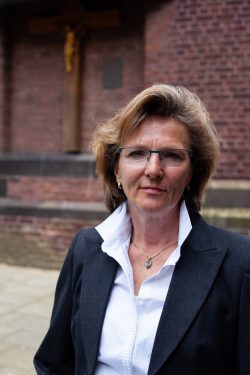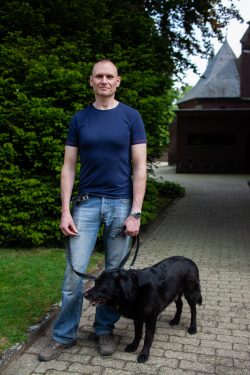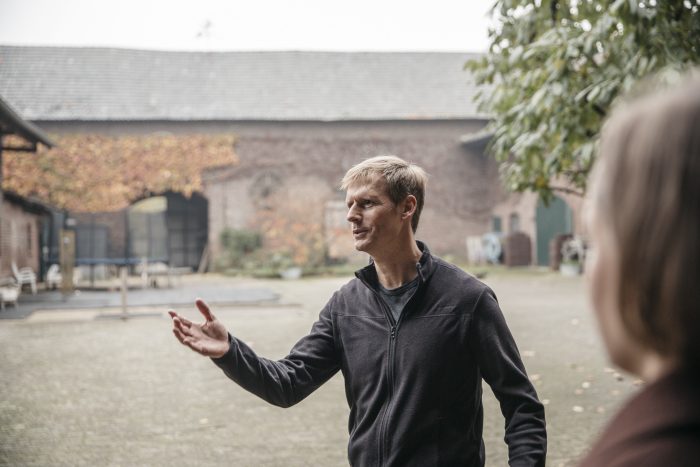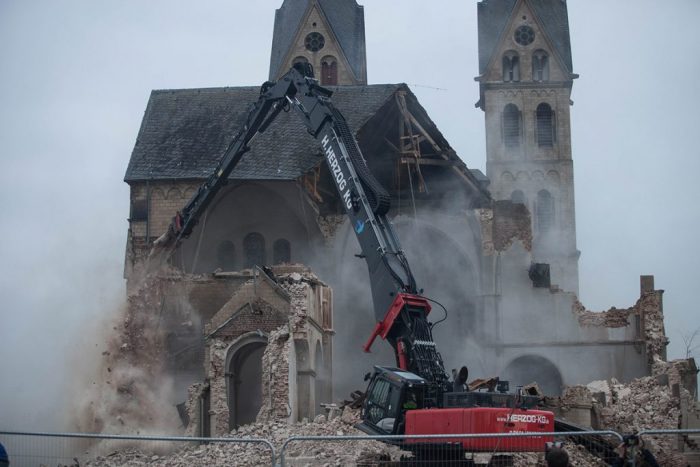RWE’s Senseless Destruction
11 March, 2020
Hedwig Drabik, Resident of Keyenberg
Hedwig Drabik is a resident of the village of mines despite the fact that that industry is Keyenberg, in North Rhine-Westphalia, Germany. She has lived there for 62 years, having grown up in the region formerly known as the Sudetenland, before being expelled, following the liberation of Czechoslovakia in the aftermath of World War II. She says she survived the East German uprising of 1953 and the GDR, but now faces “expulsion” for the second time in her life. Not because of war, or geopolitical struggle, but becasue her house lies in the way of German’s biggest energy company and its absurd commitment to expanding its lignite mines despite the fact that that industry is making huge financial losses. Keyenberg is one of a cluster of villages unfortunate enough to be located in close proximity to RWE’s Garzweiler lignite mine. In 2018, Mrs Drabik witnessed first hand the destruction of nearby the village Immerath and its iconic cathedral, as it was cleared to make way for the mine. She now fears the same fate awaits Keyenberg, where she has raised three children and with some weight of feeling describes as “home”. Unless of course RWE or its primary financier BNP Paribas do the responsible thing and change course. 
“I survived the GDR, I survived the East German uprising, and now I am standing in front of this and I don’t think I can cope”.
Europe Beyond Coal is shocked that RWE is pressing ahead with its plans to destroy villages like Keyenberg and clear the nearby and clear the nearby ancient Hambach Forest. Particularly when Germany’s lignite sector haemorrhaged €664 million in losses in the first half of 2019, and despite the knoeledge that the coal beneath Keyenberg needs to stay in the ground if Europe is to respect the goals of the UN Paris Climate Agreement. To add insult to injury, RWE has also admitted that its prospective projects, which necessitate this level of destruction, may never even go ahead. At a atime when the closure of all coal infrastructure is a vital priority to avert dangerous climate change and reduce the health impacts of air pollution, destroying lives to expand a loss-making industry for polluting projetcs that aren’teven guaranteed to go ahead is simply incomprehensible to ordinary people. What might amount to a refusal to accept reality on behalf of two coorporations is resulting in real dispair among local residents. Following the destruction of Immerath Cathedral, residents in the area have conducted dispiriting deconsecration services for churches in nearby Manheim and Morschenichand, and Mrs Drabik fears that Keyenberg’s church will be next.
“All my three children were baptised here, they received their first communion here, went to school here. My husband was a verger, organist and choirmaster. We have a wonderful old organ – what will happen to that, nobody knows”.
Mrs Drabik says the overarching feeling is one of rootlessness, as whole families are forced to relocate, changing jobs, moving schools, often with different generations opting to move to different locations. This has broken up multigenerational families that until recently had lived together in close-knit communities. Mrs Drabik’s own children are a case in point:
“Martina, Michael and Andrea, all now live elsewhere because they think the village will soon be gone. They keep saying, ‘We’ll never be able to return to our roots’. It leaves a big hole. We are leaving a world to our children that is horrible, that is created by humans. There is clear evidence that it is not necessary to keep tearing everything down. There is not much coal beneath this ground, scientists are saying that too, yet RWE just won’t back off”.
 Barbara Zeemann- Oberherr, Resident of Keyenberg
Barbara Zeemann- Oberherr, Resident of Keyenberg
With all of this personal family history rooted in the local area, she’s critical of the German Coal Commission’s decision to only recommend and not oblige RWE to suspend its plans to destroy the nearby Hambach Forest, which is being eaten away by the RWE-owned Garzweiler open-cast lignite mine.
“The coal compromise does not make any difference to our situation!” she says. “That’s why the struggle continues, because it is not meaningful. We are fighting on because it’s a political issue, and as long as the politicians don’t say clearly what it means, we can’t do anything. The coal compromise says it is ‘desirable’ that the Hambach Forest will be preserved. ‘Desirable’.
Barbara Zeemann-Oberherr has lived in Keyenberg for 38 years. She can document her family’s presence in the area back to 1671, with all her ancestors buried in the local church up until 1912. After this, the chapel was enlarged, incorporating their tombstones in the walls during the process of reconstruction. “The church is simply beautiful,” she says. “We have baptised our children here, we got married here, my children were both altar servers here. The church is the heart of the village, everything takes place around it – it just belongs to it”.
“And there is no talk of the fate of the villages”. It is perhaps this feeling of being overlooked, or even discarded, that has helped galvanise the community for the struggle ahead. For Ms Zeemann-Oberherr, it’s not just about pushing back against RWE, it’s also about understanding the wider situation and proposing alternative ways forward for the future.
“For me, as Joe Bloggs, the open pit mine should be downsized, and downsized a lot,” she says. “The coal companies need to quit coal earlier and the state should be subsidising solar PV, like it used to back in the day. If everyone had solar panels on their roof we would be halfway there already.”
Ingo Bajerke, Resident of Keyenberg 
Ingo Bajerke has lived in Keyenberg his entire life and had previously counted upon Germany’s coal compromise to deliver the village a reprieve. However, he now considers a lack of action on behalf of Germany’s politicians to be a key driver in RWE’s determination to forge ahead with its policy of buying up houses in the area to prolong its operations. For Mr Bajerke, it is the irrationality of the whole saga that is most frustrating, with the destruction of the villages coming before RWE has ascertained whether it can utilise the coal that lies beneath them, and whether it would ultimately even be financially profitable.
“We hoped that we would’t get evicted, but the bitter reality is that we will have to abandon our homes because of coal. Responsibility lies with the federal government to intervene if we are to achieve our climate goals, which for some reason seem to have been completely dropped from the conversation.”
“The resettlements need to be stopped and the people that want to stay need to know that they can,” says Mr Bajerke.
“Action needs to be taken now, before the existing infrastructure is completely destroyed and houses flattened. Otherwise it will be a self-fulfilling prophecy; people will just leave, regardless of whether the coal beneath Keyenberg is mined or not, simply because there will be nothing left for them to stay for.”


